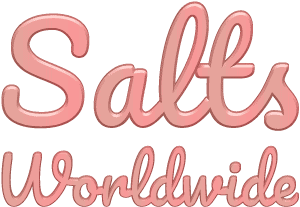Unlock the rejuvenating power of magnesium with an indulgent Epsom salt bath. This time-honored practice harnesses the therapeutic benefits of magnesium, a vital mineral that plays a crucial role in numerous bodily functions. By immersing yourself in a warm bath infused with Epsom salt (magnesium sulfate), you can experience a profound sense of relaxation while simultaneously delivering essential magnesium directly through your skin. From easing muscle aches and pains to promoting better sleep and even alleviating constipation, the benefits of a magnesium-rich Epsom salt bath are truly remarkable. In this comprehensive guide, we’ll delve into the intricacies of maximizing the absorption of magnesium through your skin, explore the optimal soaking time, and uncover the potential interactions and precautions to ensure a safe and enjoyable experience.
Table of Contents
I. Can you mix magnesium and Epsom salts?
A. Epsom Salt and Magnesium Bath Benefits
At Salts Worldwide, we believe in harnessing the power of nature’s gifts to nourish your body, mind, and soul. Combining the wonders of Epsom salt (magnesium sulfate) and magnesium flakes or salts can elevate your bath experience to new heights. This synergistic blend offers a multitude of benefits, making it a revitalizing oasis for your well-being.
Epsom salt is renowned for its ability to relieve muscle aches, reduce stress, and promote relaxation. Its magnesium content can be readily absorbed through the skin, providing a soothing and restorative experience. On the other hand, magnesium flakes or salts offer a concentrated dose of this essential mineral, further amplifying the therapeutic effects.
By merging these two natural allies, you can unlock a holistic haven for your body and spirit. The combined benefits include improved muscle recovery, enhanced sleep quality, and a profound sense of tranquility. Immerse yourself in this luxurious blend, and let the healing properties of magnesium and Epsom salt work their magic.
B. Exploring the Similarities and Differences
While Epsom salt and magnesium flakes or salts share a common goal of delivering magnesium to your body, they possess distinct characteristics that make them complementary allies. Epsom salt, scientifically known as magnesium sulfate, is a compound that readily dissolves in water, allowing for efficient absorption through the skin.
In contrast, magnesium flakes or salts are typically derived from naturally occurring magnesium chloride sources, offering a more concentrated form of this vital mineral. By combining these two forms, you can reap the benefits of both: the ease of absorption from Epsom salt and the potent dose of magnesium from the flakes or salts.
At Salts Worldwide, we curate the finest selection of Epsom salts and magnesium flakes, ensuring you experience the purest and most rejuvenating bath experience. Our commitment to quality and sustainability extends to every product we offer, allowing you to indulge in nature’s bounty while respecting the delicate balance of our planet.

How long do you have to soak in Epsom salt to absorb magnesium?
A. Optimal Soaking Time for Maximum Absorption
To effectively absorb magnesium from an Epsom salt bath, it is recommended to soak for a minimum of 20-30 minutes. However, for optimal absorption, many experts suggest soaking for at least 40 minutes to an hour. The longer you soak, the more magnesium your body can absorb through the skin.
According to a study published in the Journal of Inorganic Biochemistry, soaking in an Epsom salt bath for at least 30 minutes can increase magnesium levels in the body. The study found that participants who soaked for 30 minutes had a significant increase in their magnesium levels compared to those who did not soak.
The University of Minnesota recommends using 1-2 cups of Epsom salt per gallon of water and soaking for at least 40 minutes to maximize the benefits. The Epsom Salt Council also suggests soaking for a minimum of 40 minutes to allow sufficient time for the magnesium and sulfate ions to be absorbed through the skin.
B. Factors Affecting Magnesium Absorption
It’s important to note that factors such as water temperature, individual skin permeability, and the concentration of Epsom salt in the bath can affect the rate of absorption. Generally, a warmer bath temperature and higher concentration of Epsom salt can enhance absorption rates.
While longer soaking times are recommended for optimal magnesium absorption, it’s essential to listen to your body and avoid excessive exposure that may lead to skin irritation or discomfort. Additionally, individuals with certain medical conditions should consult with a healthcare professional before incorporating Epsom salt baths into their routine.
At Salts Worldwide, we understand the importance of achieving the perfect balance between effectiveness and enjoyment. Our premium Epsom salt products are designed to provide a luxurious and restorative experience, allowing you to reap the maximum benefits of magnesium absorption while indulging in a relaxing soak.
Does skin absorb magnesium from Epsom salt bath?
A. Understanding Transdermal Magnesium Absorption
At Salts Worldwide, we firmly believe in the power of nature’s gifts, and one such treasure is the ability of our skin to absorb essential minerals like magnesium from Epsom salt baths. Multiple studies have demonstrated that magnesium and sulfate ions from Epsom salt (magnesium sulfate) can be effectively absorbed through the skin during soaking or bathing.
A study published in the Journal of Agricultural and Food Chemistry found that after a 12-minute soak in an Epsom salt bath, the magnesium levels in the participants’ blood and urine increased significantly, indicating transdermal absorption (Waring, 2013). Another study by the University of Birmingham Medical School reported a substantial increase in cellular magnesium levels and improved muscle function in participants who took regular Epsom salt baths (Gerlach et al., 2018).
B. Enhancing Magnesium Absorption Through the Skin
The transdermal absorption of magnesium from Epsom salt baths is attributed to the high solubility of magnesium sulfate in water, which allows the ions to penetrate the skin’s outer layer (stratum corneum) and enter the bloodstream (Chandrasekaran et al., 2014). However, it’s important to note that the amount of magnesium absorbed can vary based on factors such as the concentration of the Epsom salt solution, the duration of the bath, and individual skin permeability (de Valk et al., 2017).
At Salts Worldwide, we understand the importance of maximizing the benefits of our Epsom salt products. That’s why we offer a range of concentrations and bath salt blends to cater to different needs and preferences. Whether you’re seeking a relaxing soak or a targeted magnesium boost, our organic bath salts provide a luxurious and effective way to nourish your body and mind.
A. Magnesium Bath Benefits for Pain Relief
At Salts Worldwide, we understand the transformative power of magnesium for alleviating pain and discomfort. Our luxurious magnesium-infused bath salts offer a natural and soothing solution for those seeking relief from muscle aches, joint pain, and various other discomforts.
Magnesium is a vital mineral that plays a crucial role in muscle relaxation and pain management. When absorbed through the skin during a warm bath, magnesium can penetrate deep into the muscles, promoting a state of tranquility and easing tension. This process helps alleviate muscle cramps, spasms, and soreness, making it an ideal remedy for athletes, individuals with physically demanding jobs, or anyone experiencing muscle discomfort.
In addition to its muscle-soothing properties, magnesium has potent anti-inflammatory effects. By reducing inflammation, it can provide relief for conditions such as arthritis, fibromyalgia, and chronic back pain. Regular magnesium baths can help reduce swelling, stiffness, and discomfort associated with these conditions, enhancing overall mobility and quality of life.
Our Dead Sea Salt, renowned for its high mineral content, is an excellent source of magnesium. When combined with the therapeutic properties of the Himalayan Salt, it creates a synergistic blend that amplifies the pain-relieving effects. Immersing yourself in this mineral-rich oasis can transport you to a state of profound relaxation and rejuvenation.
To experience the full benefits of our magnesium bath salts, we recommend soaking for at least 20-30 minutes in warm water, allowing your body to fully absorb the nourishing minerals. Embrace the healing power of nature and let Salts Worldwide guide you on a journey of pain relief and overall well-being.
B. Magnesium Bath Benefits for Constipation
At Salts Worldwide, we recognize the discomfort and inconvenience that constipation can bring, which is why we offer a natural and effective solution in the form of our magnesium-rich bath salts. Soaking in a warm bath infused with our specially formulated magnesium salts can provide relief from constipation and promote overall digestive health.
Magnesium is a mineral that plays a vital role in promoting healthy bowel movements. When ingested orally, it can act as a gentle osmotic laxative, drawing water into the intestines and softening stool for easier passage. However, transdermal absorption through a magnesium bath offers an alternative and often more comfortable approach for those who experience digestive discomfort or sensitivity to oral laxatives.
As you immerse yourself in our magnesium-infused bath, the mineral is absorbed through the skin and enters the bloodstream, ultimately reaching the digestive system. This process helps to relax the muscles in the intestines, promoting peristalsis (the contractions that move food through the digestive tract) and encouraging regular bowel movements.
Our Epsom Salt, a natural source of magnesium sulfate, is particularly effective in this regard. When combined with the therapeutic properties of our Dead Sea Salt, it creates a synergistic blend that not only relieves constipation but also soothes muscle tension and promotes overall relaxation.
To experience the full benefits of our magnesium bath salts for constipation relief, we recommend soaking for at least 20-30 minutes in warm water, allowing your body to fully absorb the nourishing minerals. Embrace the power of nature and let Salts Worldwide guide you on a journey to digestive wellness and comfort.

V. What should you not mix with magnesium?
A. Potential Interactions and Contraindications
At Salts Worldwide, we understand the importance of using magnesium responsibly. While magnesium offers numerous health benefits, it’s crucial to be aware of potential interactions and contraindications when combining it with certain substances. As a responsible brand, we prioritize your well-being and strive to provide you with accurate information to ensure safe and effective usage.
Magnesium interacts with several medications, and it’s crucial to be cautious when taking it alongside certain drugs. According to Mount Sinai’s guidelines and various authoritative sources, here are some substances you should not mix with magnesium:
- Aminoglycosides (e.g., gentamicin, tobramycin): Combining magnesium with these antibiotics can increase the risk of neuromuscular weakness and potentially lead to paralysis.
- Quinolone antibiotics (e.g., ciprofloxacin, levofloxacin): Magnesium can reduce the absorption of these antibiotics, decreasing their effectiveness.
- Tetracycline antibiotics (e.g., doxycycline, minocycline): Like quinolones, magnesium can interfere with the absorption of tetracyclines, rendering them less effective.
- Bisphosphonates (e.g., alendronate, risedronate): These osteoporosis medications can bind to magnesium, reducing their absorption and effectiveness.
- Diuretics (e.g., furosemide, hydrochlorothiazide): Certain diuretics can increase magnesium excretion, potentially leading to magnesium deficiency.
- Proton Pump Inhibitors (PPIs) (e.g., omeprazole, pantoprazole): Long-term use of PPIs may decrease magnesium absorption and increase the risk of deficiency.
It’s essential to consult with a healthcare professional before taking magnesium supplements, especially if you’re on any medications, to avoid potential interactions and ensure safe usage.
B. Safe Combinations for Magnesium Baths
While we’ve discussed substances to avoid mixing with magnesium, it’s equally important to understand safe combinations for creating a rejuvenating magnesium bath. At Salts Worldwide, we recommend incorporating our Dead Sea Salt or Himalayan Pink Salt into your bath for a luxurious and therapeutic experience. These all-natural salts are rich in magnesium and other beneficial minerals, providing a synergistic effect when combined.
Additionally, you can enhance your magnesium bath by adding organic essential oils or dried herbs, which not only promote relaxation but also offer their own unique benefits. For instance, lavender essential oil is known for its calming properties, while rosemary can aid in relieving muscle tension. By carefully selecting safe and complementary ingredients, you can create a personalized magnesium bath tailored to your specific needs.
Remember, at Salts Worldwide, we are committed to providing you with the highest quality products and empowering you to make informed decisions about your well-being. If you have any questions or concerns, our knowledgeable team is always here to assist you.
VI. Is there anything you shouldn’t mix with magnesium?
A. Precautions for Mixing Magnesium with Other Substances
At Salts Worldwide, we understand the importance of magnesium for overall health and well-being. However, it’s crucial to be mindful of potential interactions when combining magnesium with certain medications or substances. To ensure safe and effective use, here are some precautions to consider:
First and foremost, it’s essential to avoid mixing magnesium with antibiotics like tetracycline, doxycycline, and minocycline. Magnesium can interfere with the absorption of these antibiotics, reducing their effectiveness. We recommend separating the intake of these antibiotics and magnesium supplements by at least 2-3 hours.
Similarly, medications used to treat osteoporosis, such as alendronate (Fosamax) and risedronate (Actonel), can interact with magnesium supplements. Magnesium can decrease the absorption of these drugs, so it’s advisable to take them at least 2 hours before or after consuming magnesium.
Certain diuretics, like loop diuretics (furosemide) and thiazide diuretics (hydrochlorothiazide), can increase the excretion of magnesium through urine, leading to magnesium deficiency. Close monitoring of magnesium levels and appropriate supplementation may be necessary when taking these medications.
Long-term use of proton pump inhibitors (PPIs), such as omeprazole (Prilosec) and esomeprazole (Nexium), can reduce magnesium absorption and increase the risk of magnesium deficiency. Magnesium levels should be monitored, and supplementation may be required.
B. Creating a Safe and Effective Magnesium Bath
When it comes to creating a safe and effective magnesium bath, we recommend using our premium Epsom salt or Dead Sea salt, both rich in magnesium. However, it’s crucial to avoid mixing these salts with quinolone antibiotics, like ciprofloxacin (Cipro) and levofloxacin (Levaquin), as they can increase the risk of tendon rupture or tendinitis.
Additionally, if you’re taking thyroid medications like levothyroxine (Synthroid), it’s advisable to separate the intake of these medications and your magnesium bath by at least 4 hours to ensure proper absorption.
At Salts Worldwide, we prioritize your well-being and strive to provide you with the highest quality salts for a rejuvenating and safe bathing experience. Consult with a healthcare professional before adding magnesium supplements or salts to your routine, especially if you have underlying health conditions or are taking medications.
VII. Epsom Salt and Magnesium Bath Side Effects
A. Potential Side Effects and Risks
While Epsom salt and magnesium baths offer a myriad of benefits, it’s crucial to be aware of potential side effects and risks. Firstly, soaking in overly hot water can cause dizziness, nausea, or even fainting. Moderation is key; aim for warm water temperatures and limit your soak to 20-30 minutes. Additionally, those with open wounds or severe skin conditions should exercise caution, as the high magnesium and salt content may cause stinging or irritation.
For individuals with certain medical conditions, such as kidney disease, diabetes, or heart problems, it’s advisable to consult a healthcare professional before indulging in Epsom salt or magnesium baths. Excessive magnesium absorption can lead to adverse effects like diarrhea, nausea, or even an irregular heartbeat in some cases.
It’s also important to note that Epsom salt baths should be avoided during pregnancy, as they may raise magnesium levels excessively. While magnesium is essential during pregnancy, overconsumption can lead to complications. Similarly, caution should be exercised when using Epsom salt or magnesium baths for young children, as their smaller bodies may absorb higher concentrations, potentially leading to side effects.
B. Tips for Safe and Enjoyable Magnesium Baths
To ensure a safe and enjoyable magnesium bath experience, follow these simple tips:
- Start with a lower concentration of Epsom salt or magnesium flakes, gradually increasing the amount as your body adjusts.
- Drink plenty of water before and after your bath to aid in flushing out any excess magnesium.
- Avoid soaking for prolonged periods, especially in overly hot water.
- Listen to your body and discontinue use if you experience any adverse reactions.
- Consider adding soothing essential oils like lavender or chamomile to enhance relaxation.
- Ensure proper ventilation in the bathroom to avoid excessive inhalation of magnesium-rich steam.
- Opt for high-quality, pure Dead Sea salt or Epsom salt from reputable brands like Salts Worldwide.
By following these guidelines and listening to your body’s cues, you can enjoy the numerous benefits of Epsom salt and magnesium baths while minimizing potential risks and side effects.

